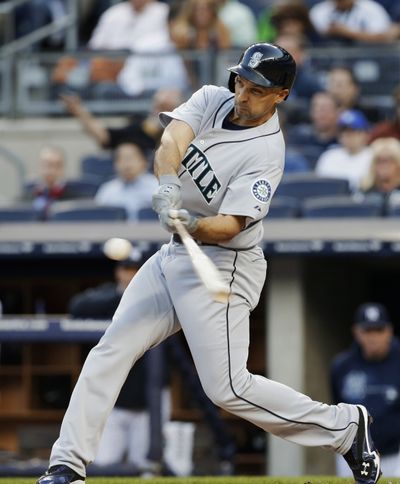Mariners’ next manager? What about Raul Ibanez?

Freddy Garcia, his team’s nominal ace, had just been pummeled in a start unacceptable for a nominal ace. This was June, 2002, so long ago that none of the post-game visitors in Lou Piniella’s office flinched when the Seattle Mariners manager struck up a match to light a cigarette.
Reporters typically ask questions and managers typically try to answer them, but Piniella’s frustration had reached the point he was posing the questions.
“You think Freddy’s tipping his pitches?” Piniella asked. The faces in the room went blank. “I might have to talk to Raul about it.”
Piniella meant Raul Ibanez, whose services as a Mariners’ problem-solver were notable because, for one, Ibanez no longer worked in Seattle – he had signed a free-agent contract with Kansas City after the 2000 season – and, for two, of all the sharp minds around baseball capable of sharing intelligence with him, Piniella’s instant choice was the Royals’ 30-year-old designated hitter.
That was the first time I sensed Ibanez’ potential as a manager. The second time was this past weekend, after Eric Wedge informed his bosses he would not seek the contract extension they probably weren’t going to offer him anyway.
Between the recent death of former owner Hiroshi Yamauchi, the past-its-time reign of CEO Howard Lincoln and president Chuck Armstrong and the uncertainty of general manager Jack Zduriencik’s status beyond 2014, the Mariners’ front office has deteriorated into the Exxon Valdez of major league organizations.
What conventionally qualified replacement for Wedge wants to become the eighth Mariners’ manager in the 11 years since Piniella’s departure?
Zduriencik told 710 ESPN Seattle on Sunday that he’s already gotten inquiries from candidates with impressive credentials. Zduriencik didn’t specify how many calls he’s taken, but he said: “You’d be surprised.”
Surprised? Uh, Jack, if there’s but one candidate whose interest in the job captivates Mariners fans, I’ll be astonished.
As Zduriencik begins his search for that special somebody capable of connecting with both players and a fallen-away public, allow me to submit a familiar and yet intriguing name:
Raul Ibanez.
His team-leading 29 home runs in 2013 obscured the fact he’s facing, at 41, the “What Do I Do Next?” phase of his life.
He could retire. As a free agent, he could sign a contract similar to the one-year deal he got from the Mariners, who guaranteed him $2.5 million for this season. Or he could take advantage of his exceptional baseball insight and formally preside over a team that reacquired him, last December, to lead by example.
During his round-table radio chat after the season finale, Zduriencik sounded as though he’s putting a premium on the next manager’s clubhouse communication skills.
“One of the big things I’ll be looking for is somebody who teaches a terrific work ethic to these kids, to get them over the top on the finer points of the game,” said Zduriencik, echoing the very reasons he brought Ibanez back to Seattle. ”I want to allow these kids to take the next step and eliminate the losing environment that’s taken over the last few years.”
Absent the obvious skills of a superior athlete, the Mariners’ 36th-round selection from the 1992 draft is an expert taking the next step. A roster-fringe type through the first half of his pro career, Ibanez’ remarkable dedication enabled him to thrive over the second half.
His specialty has been hitting line drives – six seasons with 90 or more RBI, 10 consecutive seasons with at least 30 doubles – but Ibanez’ original ticket into pro baseball, like most managers, was as a catcher.
The son of a Cuban-born chemist, Ibanez is smart, with an exceptional baseball IQ. A few months ago, when I asked him what he knew about Ted Williams (who also hit 29 home runs at the age of 41), Ibanez smiled. The Splinter’s book on the science of hitting, he recalled, was a precious childhood possession.
It’s possible Ibanez would rather continue playing games than manage them. So let him do both. Player-managers, who weren’t unusual until the 1950s, have become as antiquated as Sunday doubleheaders and pregame infield practice. But what was wrong with Sunday doubleheaders and pregame infield?
Does Raul Ibanez want to manage? Has he ever even considered an occupation I figured was lobbed toward his wheelhouse in 1992?
Fair question, but one worth asking.